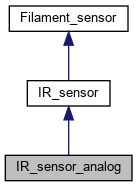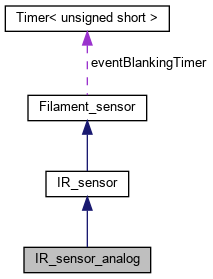

Public Types | |
| enum class | SensorRevision : uint8_t { _Old = 0 , _Rev04 = 1 , _Undef = EEPROM_EMPTY_VALUE } |
 Public Types inherited from Filament_sensor Public Types inherited from Filament_sensor | |
| enum class | State : uint8_t { disabled = 0 , initializing , ready , error } |
| enum class | SensorActionOnError : uint8_t { _Continue = 0 , _Pause = 1 , _Undef = EEPROM_EMPTY_VALUE } |
Public Member Functions | |
| void | init () |
| bool | update () |
| void | voltUpdate (uint16_t raw) |
| uint16_t | __attribute__ ((noinline)) getVoltRaw() |
| SensorRevision | getSensorRevision () const |
| const char * | __attribute__ ((noinline)) getIRVersionText() |
| void | setSensorRevision (SensorRevision rev, bool updateEEPROM=false) |
 Public Member Functions inherited from IR_sensor Public Member Functions inherited from IR_sensor | |
| void | init () |
| void | deinit () |
| bool | update () |
| bool | getFilamentPresent () const |
| void | settings_init () |
 Public Member Functions inherited from Filament_sensor Public Member Functions inherited from Filament_sensor | |
| void | setAutoLoadEnabled (bool state, bool updateEEPROM=false) |
| bool | getAutoLoadEnabled () const |
| void | setRunoutEnabled (bool state, bool updateEEPROM=false) |
| bool | getRunoutEnabled () const |
| void | setActionOnError (SensorActionOnError state, bool updateEEPROM=false) |
| SensorActionOnError | getActionOnError () const |
| bool | getFilamentLoadEvent () const |
| bool | isError () const |
| bool | isReady () const |
| bool | isEnabled () const |
Additional Inherited Members | |
 Static Public Member Functions inherited from IR_sensor Static Public Member Functions inherited from IR_sensor | |
| static bool | probeOtherType () |
 Static Public Member Functions inherited from Filament_sensor Static Public Member Functions inherited from Filament_sensor | |
| static void | setEnabled (bool enabled) |
 Protected Member Functions inherited from Filament_sensor Protected Member Functions inherited from Filament_sensor | |
| void | settings_init_common () |
| bool | checkFilamentEvents () |
| void | triggerFilamentInserted () |
| void | triggerFilamentRemoved () |
| void | filRunout () |
| void | triggerError () |
 Protected Attributes inherited from Filament_sensor Protected Attributes inherited from Filament_sensor | |
| State | state |
| bool | autoLoadEnabled |
| bool | runoutEnabled |
| bool | oldFilamentPresent |
| bool | postponedLoadEvent |
| ShortTimer | eventBlankingTimer |
| SensorActionOnError | sensorActionOnError |
Member Function Documentation
◆ update()
| bool IR_sensor_analog::update | ( | ) |
The trouble is, I can hold the filament in the hole in such a way, that it creates the exact voltage to be detected as the new fsensor We can either fake it by extending the detection window to a looooong time or do some other countermeasures
what we want to detect: if minvolt gets below ~0.3V, it means there is an old fsensor if maxvolt gets above 4.6V, it means we either have an old fsensor or broken cables/fsensor So I'm waiting for a situation, when minVolt gets to range <0, 1.5> and maxVolt gets into range <3.0, 5> If and only if minVolt is in range <0.3, 1.5> and maxVolt is in range <3.0, 4.6>, I'm considering a situation with the new fsensor
If and only if minVolt is in range <0.0, 0.3> and maxVolt is in range <4.6, 5.0V>, I'm considering a situation with the old fsensor Note, we are not relying on one voltage here - getting just +5V can mean an old fsensor or a broken new sensor - that's why we need to have both voltages detected correctly to allow switching back to the old fsensor.
The documentation for this class was generated from the following files:
- Filament_sensor.h
- Filament_sensor.cpp